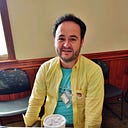Member-only story
The brother that he never had: Kent McCray remembers the multi-talented Michael Landon on his birthday
If you are not a Medium member, read the complete article here for free.
Perhaps tough to fathom, but actor-writer-director-producer Michael Landon would be an octogenarian had he not succumbed to brutal pancreatic cancer in July 1991. Landon was noted for his unabashedly lucrative 32-year run on three beloved NBC television series — Bonanza, Little House on the Prairie, and Highway to Heaven.
Though he inexplicably never won an Emmy, the dashing and handsome Scorpio was cherished by his fans, rarely refusing to sign an autograph or pose for a photo. His legend lives on in perpetual syndication, home video, and YouTube.
Several of his children are in the family business of show, including Michael Landon, Jr., who maintains a career directing family flicks for the Hallmark Channel, Christopher Landon, the screenwriter behind Shia LaBeouf’s acclaimed Disturbia, and Jennifer Landon, who notched a consecutive trio of Daytime Emmy awards for long-running soap As the World Turns.
Kent McCray rose to prominence as an associate producer with Bob Hope during the late 1950s, traveling the world and filming specials during his well-received USO tours. McCray befriended Landon in 1962 on the set of Bonanza in lieu of a fiery introductory argument that nearly resulted in fisticuffs.
The genial, soft-spoken, and down-to-earth McCray never looked back, working with the actor all the way up until his final project, Us [1991], a change of pace drama about a wrongly-imprisoned man renewing complicated family ties.
Over the course of two engrossing phone interviews, Landon’s best man shares heartfelt and sometimes painful memories about an inimitable human being whose contagious, high-pitched laugh never failed to brighten his day. Visiting a terminally ill teenager and ensuring her controversial last request, what happened when the actor didn’t have a driver’s license at a Los Angeles airport, and shocking Johnny Carson at Landon’s 50th birthday bash with his impersonation of a poodle dress-sporting, full figured ’50s gal are just the tip of the iceberg. McCray died on June 3, 2018, just four days prior to his 90th birthday.
